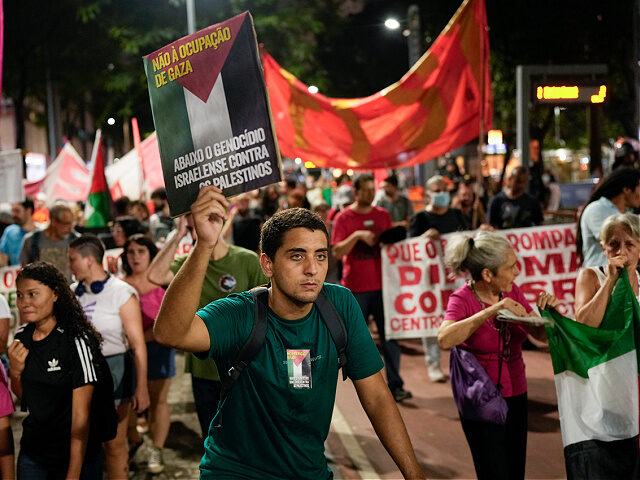The socialist government of Brazil announced on Monday that it had enacted a free trade agreement with the Palestinian Authority, the organization in charge of the West Bank, in a show of solidarity with the anti-Israel cause.
Brazil, which officially recognizes “Palestine” as a state and withdrew its ambassador to Israel in the aftermath of the barbaric October 7 siege of Israel by the jihadist terrorist organization Hamas, enacted the deal by ratifying a long-delayed proposed free trade agreement between the “state of Palestine” and Mercosur, a regional trade bloc consisting of Brazil, Argentina, Paraguay, and Uruguay. The other members of Mercosur have not approved the agreement.
Brasilia described the deal as a free trade agreement with “Palestine” but it appears to be applicable only to the Palestinian Authority, not to Hamas, which governs Gaza.
The deal follows a month of antagonistic statements towards Israel by radical leftist President Luiz Inácio Lula da Silva, whom Israel declared persona non grata in February after Lula compared Israel’s self-defense operations against Hamas to the actions of Nazi Germany. Israel demanded an apology Lula has yet to grant, opting instead to repeatedly accuse Israel of “genocide” for waging war against Hamas.
Lula himself announced the ratification of the deal during the ongoing Mercosur summit on Monday.
“We are proud to be the first country in the bloc to ratify the free trade agreement with Palestine,” Lula said. “But I cannot help but regret that this occurs in a context in which the Palestinian people are suffering as a result of a completely irrational war.”
The Brazilian Foreign Ministry said on Monday that the free trade agreement was now in effect and would aid with support for the “Palestinian” cause against Israel and with developing deeper ties with the greater Middle East, presumably omitting Israel.
Preceding the enactment of the deal, the Foreign Ministry issued a statement on Friday explaining that the free trade deal was a document created by Mercosur and introduced to the bloc by Paraguay, which accepted Brazil’s ratification last week. It noted that the “state of Palestine,” by which it appears to mean the Palestinian Authority in the West Bank, ratified the free trade deal in April.
As both the Palestinian Authority and Brazil have signed the deal, “the agreement will come into force for Brazil and the State of Palestine after thirty days.” The Foreign Ministry clarified that none of the other Mercosur nations are beholden to the agreement until they ratify the free trade deal on an individual basis. It is not clear at press time if any of the other three South American countries, all governed by right-wing presidents, will do so. Argentina, in particular, is widely expected not to enact such a deal under its current libertarian President Javier Milei, a staunch supporter of Israel who prioritized a visit to the country following October 7.
Milei pointedly opted not to attend the Mercosur summit, choosing to travel to Brazil, instead, while Lula was not in the country. Milei used the opportunity to address the Brazilian version of the Conservative Political Action Conference (CPAC) and meet with Lula’s predecessor, former Brazilian President Jair Bolsonaro, who had once promised to open a Brazilian embassy in Jerusalem but failed to deliver on that commitment.
While the Palestinian Authority reportedly signed the free trade agreement in April, the document had been floating around in Mercosur’s bureaucracy since 2011, the Brazilian government noted.
“The agreement is a concrete contribution towards an economically viable Palestinian state that can live in a peaceful and harmonious way with its neighbors,” the Brazilian Foreign Ministry said on Friday.
The deal will cover, Brazil noted, “trade in goods; rules of origin; bilateral safeguards; technical regulations, assessment and compliance standards and procedures; sanitary and phytosanitary measures; technical and technological cooperation; institutional arrangements and dispute resolution.”
Lula’s overture to the Palestinian Authority will likely sour relations even further with Israel. While Brazil has traditionally maintained a friendly posture towards Israel, Lula’s public support of the Hamas cause following October 7 outraged the Israeli government. Lula has repeatedly accused Israel of committing “genocide” by pursuing Hamas terrorists, including less than a month after the October 7 attack. Relations deteriorated significantly, however, in February, when Lula compared Israel’s self-defense actions to the Holocaust.
“What is happening in the Gaza Strip with the Palestinian people has no parallel in other historical moments. In fact, it did exist when Hitler decided to kill the Jews,” Lula said in an address to the African Union Summit in Ethiopia that month.
The Israeli government responded by banning Lula from Israel until he apologized for his remarks, which he has not done at press time, and summoning the Brazilian ambassador.
“What a disgrace. Your comparison is promiscuous, delusional. Shame on Brazil and a spit in the face of Brazilian Jews,” Israeli Foreign Minister Israel Katz said in a social media message at the time. “It’s not too late to learn history and apologize. Until then — you will remain persona non grata in Israel!”
Rather than apologize, Lula claimed that Israel was lying about his statements, attempting to argue that his references to “when Hitler decided to kill the Jews” was not intended to invoke the Holocaust.
“I didn’t say the word ‘Holocaust.’ ‘Holocaust’ was the interpretation of the Prime Minister of Israel. It wasn’t mine,” Lula claimed.
Lula recalled his ambassador to Tel Aviv in May and has yet to replace him, downgrading bilateral ties.

COMMENTS
Please let us know if you're having issues with commenting.